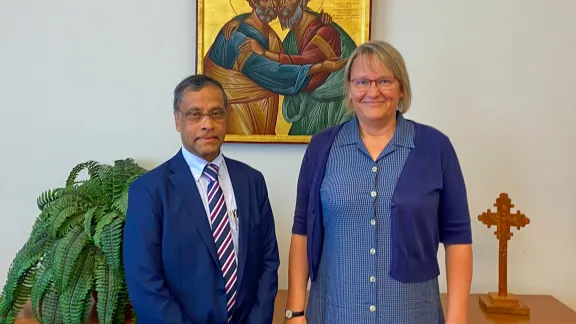
LWFâs World Service Department director, Maria Immonen and the Secretary General of Caritas Internationalis, Aloysius John. Photo: LWF/A. Danielsson
LWF’s World Service and Caritas Internationalis recommit to “stand together for the sake of the neighbor”
(LWI) - The Lutheran World Federation (LWF) and Caritas Internationalis (CI), the global confederation of Catholic aid and development agencies, have committed to increased cooperation and service to the world’s most marginalized communities, alongside greater involvement of the two churches.
During a meeting in Rome on 25 June, the director of LWF World Service and the Secretary General of the Caritas network affirmed that by strengthening their humanitarian work for justice, peace and dignity for all people, their commitment may also serve as a “catalyst that can shape our doctrinal dialogues.”
The “Common Vision,” jointly presented by World Service (WS) director, Maria Immonen, and Caritas Secretary General, Aloysius John, affirms that the two organizations “stand together for the sake of the neighbor – a call which is rooted in faith.” It stresses that “the projects of CI and WS go beyond humanitarian aid, for in them we discover the spiritual dimension of the work of service.” It affirms that “the aspiration to share, to establish justice and reconciliation with each other, leads us to discover the humanity in each of us as children of one creator.”
Lutheran World Service and Caritas Internationalis stand together for the sake of the neighbor – a call which is rooted in faith.
The meeting in Rome is a continuation of a process initiated in the Swedish cities of Lund and Malmö in 2016 during the joint commemoration of the Reformation. During those events, the LWF and Caritas signed a ‘Declaration of Intent’ to step up their shared commitment to joint witness and service.
The new document notes that “The Common Prayer service in Lund cathedral and the commitment signed in Malmö arena, was a “movement from prayer to action, from a liturgy of thanksgiving, lament, confession and absolution, to an ecumenical commitment for all our neighbors, whoever they may be, wherever they may be.” A life of prayer, it adds, “always leads to a life of solidarity with the whole human family.”
Growing grass roots cooperation
Immonen shared two examples of countries where local Caritas and World Service staff have stepped up fruitful cooperation since the Malmö event. In Nepal, she said, both organizations signed a country level agreement and began working to plan, train and explore avenues of shared engagement. This led to a joint project to install an urgently needed water supply for a village community, with World Service digging the well and Caritas providing the water tank.
A second example, cited by Immonen, is Venezuela where “needs are growing exponentially” as a result of the political and economic crisis. World Service and Caritas Venezuela have been working together on needs assessment across various regions of the country despite COVID-19 restrictions, she said. Their findings highlighted the disproportionate effect of the crisis on women, children and older adults leading to a deterioration in their health and psychosocial wellbeing. Recommendations include strengthening community support networks and in particular support for at-risk women, youth and children, Immonen added.
John shared examples of ecumenical cooperation in Africa and the Pacific region where bishops have come together to speak with “a common voice” for justice and human dignity.” In Zambia, Catholic and Lutheran bishops have joined with other Christian leaders to meet with candidates ahead of key presidential elections to share the “thirst for justice” of their communities. The Catholic bishops in the Pacific have called for a broad ecumenical reflection on Pope Francis’ encyclical Laudato Si’, noting the important implications and challenges it raises for all people in their region.
Strong signal to local churches
Lutheran Bishop Henrik Stubkjær, chair of the LWF’s Committee for World Service commented: “It is vital to show our constituencies that we can work together for the poor and marginalized. It sends a strong signal to the local churches that we are united in Christ and are building on the achievements of Malmö. But we want to go further and become even more concrete in our witness of hope to the world.”
Reflecting on how to further advance the spiritual dimension of dialogue and action at both grass roots and leadership level, Caritas and LWF are proposing to establish a steering committee to bring bishops together and support their collaboration in different regions of the world. They are also highlighting the need for stepped up advocacy on vaccine equity in the post-pandemic period, as well as increased participation of women in leadership and decision-making roles.
The Common Vision also expresses the hope that this increased commitment to joint witness and service can be a “parable of communion”, following the example of the first disciples who “shared everything they had [so that] nobody was left alone” (Acts 4: 32-34).
Caritas and the LWF are called to “bring a word of hope” to an increasingly fragmented world, the document concludes. As they witness and work for dignity, justice, human rights and sustainability, it says, “the meaning of ecumenism itself is expanded and deepened.”
LWF/P. Hitchen


